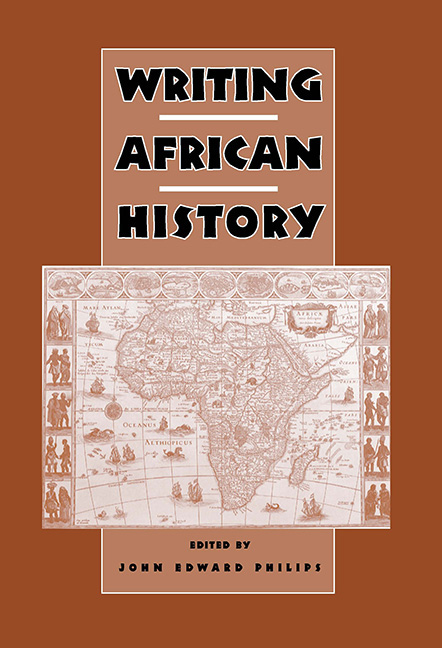Book contents
- Frontmatter
- Dedication
- Contents
- Acknowledgments
- Introduction
- Part I Background
- Part II Sources of Data
- Part III Perspectives on History
- 11 Data Collection and Interpretation in the Social History of Africa
- 12 African Economic History: Approaches to Research
- 13 Signs of Time, Shapes of Thought: The Contributions of Art History and Visual Culture to Historical Methods in Africa
- 14 Methodologies in Yorùbá Oral Historiography and Aesthetics
- 15 Local History in Post-Independent Africa
- 16 Africa and World-Systems Analysis: A Post-Nationalist Project?
- 17 “What Africa Has Given America”: African Continuities in the North American Diaspora
- 18 History and Memory
- 19 Writing About Women: Approaches to a Gendered Perspective in African History
- Part IV Conclusion
- Contributors
- Index
- Miscellaneous Endmatter
19 - Writing About Women: Approaches to a Gendered Perspective in African History
from Part III - Perspectives on History
Published online by Cambridge University Press: 11 May 2017
- Frontmatter
- Dedication
- Contents
- Acknowledgments
- Introduction
- Part I Background
- Part II Sources of Data
- Part III Perspectives on History
- 11 Data Collection and Interpretation in the Social History of Africa
- 12 African Economic History: Approaches to Research
- 13 Signs of Time, Shapes of Thought: The Contributions of Art History and Visual Culture to Historical Methods in Africa
- 14 Methodologies in Yorùbá Oral Historiography and Aesthetics
- 15 Local History in Post-Independent Africa
- 16 Africa and World-Systems Analysis: A Post-Nationalist Project?
- 17 “What Africa Has Given America”: African Continuities in the North American Diaspora
- 18 History and Memory
- 19 Writing About Women: Approaches to a Gendered Perspective in African History
- Part IV Conclusion
- Contributors
- Index
- Miscellaneous Endmatter
Summary
The inclusion of women and gender in African history has been flourishing in recent decades. Initially the focus of research was on women as historical actors, and historians showed that women were present and active despite their omission from much historical writing about Africa. Later more nuanced approaches discussed gender as the social construction of male and female roles, though frequently “gender” was a stand-in for women. Eventually studies of masculinity surfaced, demonstrating further that male behavior and experience should not be the norm against which women were measured, but that all history was gendered—that is, events were affected by the maleness or femaleness of the people involved.
Before the 1970s there was little published research on African women's history. Information on women in Africa was more often found in anthropological and ethnographic studies. This focus continues to be evident in the preponderance of research on African women in development rather than history per se. The first publications in the 1970s in the new wave of research dealt with women and economic change and with women as political activists. By the early 1980s the history of African women had emerged as a vibrant and steadily expanding area of research and study. Scholars were motivated, as with women's history in other world areas, by the development of the international feminist movement, and from the beginning there was a political component to much of the research and writing in African women's history. African women's history also paralleled the expansion of African history following World War II, as scholars inside and outside of Africa began to focus on historical transformations on the African continent. By the mid-1980s there were a number of important extended studies as well, still primarily focusing on women's public lives, though studies of family and sexuality were also beginning to appear. Only in the 1990s did a substantial number of monographs on specific topics begin to appear, although most new research is still found in journal and anthology articles.
Despite these advances in the historiography, many standard histories of Africa still omit women and ignore the implications of gender. Helen Bradford refers to “androcentric sins,” observing that often when women are neglected the author (usually male) will note their absence and offer an apology, but continue to write a historical analysis that ignores gender and women.
- Type
- Chapter
- Information
- Writing African History , pp. 465 - 490Publisher: Boydell & BrewerPrint publication year: 2005

